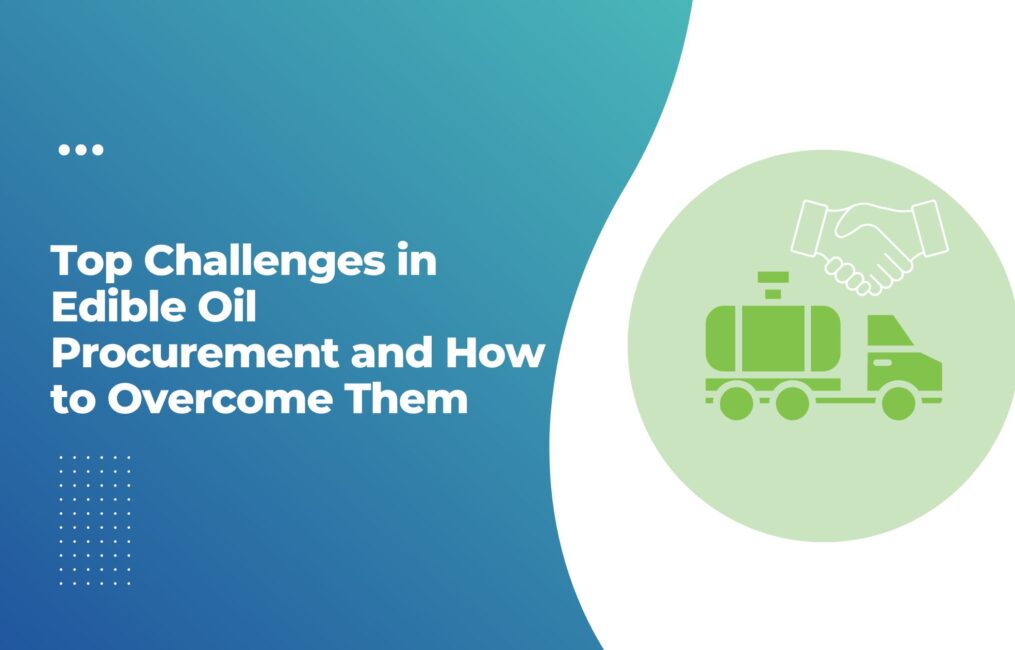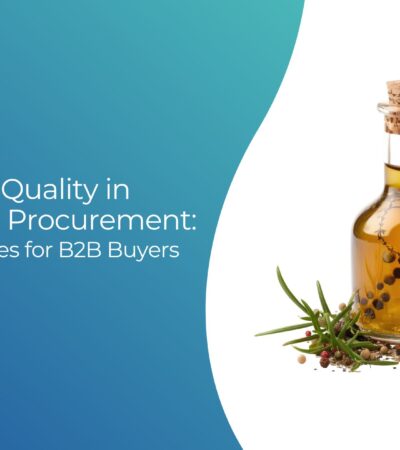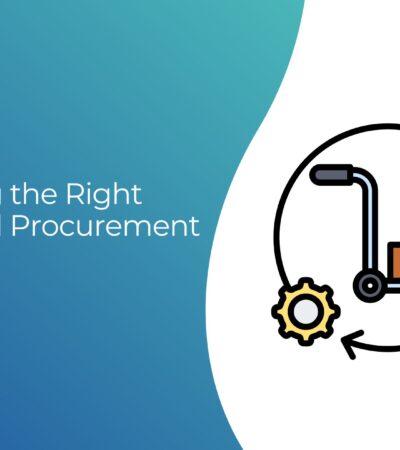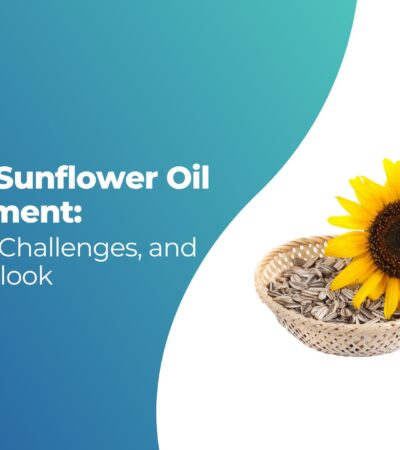Top Challenges in Edible Oil Procurement and How to Overcome Them

Edible oils are among the most essential commodities in the global food and manufacturing industries. From cooking oils in households to bulk usage in food processing, pharmaceuticals, cosmetics, and even biodiesel, demand for edible oils continues to grow year after year. India alone is one of the world’s largest consumers of edible oils, importing nearly 14–15 million tonnes annually to meet domestic demand. Sunflower oil, soybean oil, palm oil, maize oil, and rice bran oil make up the bulk of this trade.
For procurement managers, edible oil is not just another raw material—it is a high-value commodity that directly impacts production costs, product quality, and consumer satisfaction. However, procuring edible oils is far from straightforward. Global price fluctuations, logistics bottlenecks, varying quality standards, and regulatory challenges make sourcing a complex task. On top of this, businesses are under increasing pressure to prioritize sustainability and traceability, meaning buyers can no longer simply choose the cheapest supplier.
This blog highlights the top challenges faced in edible oil procurement and offers practical, actionable solutions. By understanding these hurdles and adopting a strategic approach, companies can safeguard their supply chains and gain a competitive edge in the marketplace.
Challenge 1: Price Volatility and Market Uncertainty
Why It Matters:
Edible oil markets are highly volatile. Prices often swing drastically due to climate patterns, import policies, and global demand-supply imbalances. For example, in 2022, sunflower oil prices spiked by over 40% within a few weeks due to geopolitical conflicts affecting supplies from Ukraine, one of the largest exporters. Similarly, palm oil prices fluctuate depending on production in Indonesia and Malaysia, which together account for over 80% of global palm oil exports.
Such volatility creates uncertainty for procurement managers. Budgets become harder to predict, and sudden price hikes can wipe out profit margins. For FMCG companies where edible oils form a large part of raw material costs, this volatility directly affects consumer pricing and brand competitiveness.
Solutions to Overcome Price Volatility:
- Long-term contracts: Secure supply with fixed or semi-fixed contracts to hedge against sudden price increases.
- Diversification: Source from multiple geographies. For instance, instead of relying only on sunflower oil from Eastern Europe, businesses can explore maize oil or rice bran oil sourced locally in India.
- Market intelligence: Regularly monitor global commodity updates, import trends, and currency fluctuations. Reliable procurement partners often provide such updates.
- Alternative oils: In case of extreme volatility, consider substituting with other oils that provide similar functional properties.
For a practical example of managing global sourcing risks, read: Navigating Global Supply Chains: How to Secure Reliable Refined Sunflower Oil Sourcing.
Challenge 2: Quality Inconsistency
Why It Matters:
Quality is one of the most critical factors in edible oil procurement. Poor quality or adulterated oils can damage end products, affect taste, and even lead to regulatory penalties. Parameters like Free Fatty Acid (FFA) levels, peroxide values, and moisture content determine whether oil is fit for consumption or industrial use.
For example, sunflower oil should ideally have FFA levels below 0.1% and peroxide values less than 10 meq/kg. If the oil exceeds these levels, it can result in rancidity, reduced shelf life, and consumer complaints. Adulteration is another widespread risk. There have been multiple cases in which bulk edible oils were blended with inferior or even non-edible oils to reduce costs—posing major health hazards.
Solutions to Ensure Consistent Quality:
- Demand specifications: Always request a Certificate of Analysis (COA) with details of chemical properties like FFA, peroxide value, and moisture content.
- Third-party testing: Send random samples to independent labs to verify claims.
- Supplier audits: Work with procurement partners who carry out audits of supplier facilities, checking storage hygiene, refining methods, and packaging practices.
- Reputation & traceability: Prioritize suppliers with a proven record of consistency and transparent traceability systems.
A procurement company like Neshiel Agrochem already works with a vetted network of suppliers, which significantly reduces the risks of poor quality and ensures clients receive reliable batches consistently.
Challenge 3: Supply Chain Disruptions
Why It Matters:
The edible oil supply chain is global. A disruption in one part of the world often ripples across international markets. For instance, when Indonesian authorities temporarily restricted palm oil exports in 2022, global palm oil prices shot up and alternative oils like soybean and sunflower faced sudden demand surges.
Even beyond international politics, logistics challenges such as port congestion, container shortages, or domestic transport strikes cause delays and cost escalations. In some cases, lead times for edible oil shipments have doubled compared to pre-pandemic timelines. For businesses with lean inventories, these disruptions can bring production to a halt.
Solutions to Minimize Supply Chain Risks:
- Buffer inventory: Maintain safety stock, especially for oils critical to production.
- Dual sourcing: Source both locally and internationally to reduce dependency on a single route.
- Flexible logistics: Partner with suppliers who work with multiple freight forwarders and shipping lines.
- Technology adoption: Use digital tracking systems to gain visibility over shipments.
For deeper insights into managing supplier and logistics risks, see: A Step-by-Step Guide for Effective Supplier Risk Management.
Challenge 4: Regulatory and Compliance Pressures
Why It Matters:
Edible oils are food-grade commodities, making them subject to stringent regulatory oversight. In India, edible oils must meet FSSAI (Food Safety and Standards Authority of India) standards. International buyers often require ISO 22000, HACCP, or certifications like RSPO (Roundtable on Sustainable Palm Oil) for palm oil.
Failing to comply with these standards can result in shipment rejections, fines, or even brand damage if non-compliant oils reach end consumers. Moreover, many buyers today demand oils that are Non-GMO or sourced sustainably to align with consumer expectations.
Solutions to Manage Compliance:
- Work only with certified suppliers: Ensure suppliers hold valid certifications and updated licenses.
- Documentation checks: Verify that shipping documents include compliance certifications.
- Stay updated: Regulatory standards evolve frequently, especially in the EU and US. Regularly review changes and adjust procurement practices.
- Partner advantage: Procurement companies like Neshiel often handle the complex paperwork, ensuring smooth compliance for clients.
Challenge 5: Limited Supplier Reliability
Why It Matters:
Not all suppliers are equally dependable. Some may fail to deliver on time, change terms mid-contract, or provide inconsistent quality. Such unreliability can lead to costly production stoppages and lost business opportunities. For example, if a food processor relies heavily on a single sunflower oil supplier who misses a shipment, the entire production schedule may collapse.
Solutions to Ensure Supplier Reliability:
- Supplier scorecards: Track delivery performance, rejection rates, and responsiveness.
- Start small: Test new suppliers with smaller consignments before committing to large volumes.
- Diversify base: Avoid over-dependence on one supplier; always maintain at least two or three options for each oil type.
- Procurement partners: Work with companies like Neshiel Agrochem, who already have vetted supplier networks built over decades.
Learn why global buyers increasingly choose India as a reliable sourcing base: Why Global Buyers Trust Indian Edible Oil Suppliers for Bulk Procurement.
Strategic Solutions to Overcome Procurement Challenges
After identifying the common hurdles in edible oil procurement, businesses need to move toward strategic solutions. The right strategies not only mitigate risks but also create long-term efficiency, cost savings, and competitive advantage. Let’s explore actionable ways companies can overcome the difficulties we discussed earlier.
1. Build a Diversified Supplier Network
Relying too heavily on one supplier or one geography is a recipe for disruption. For example, depending only on sunflower oil from Ukraine or palm oil from Indonesia can expose businesses to sudden shortages or price spikes.
Actionable Strategies:
- Source regionally and globally: Combine local Indian suppliers with international ones to spread risks.
- Maintain at least 2–3 suppliers for each oil type. This ensures alternatives in case of delays or failures.
- Leverage India’s advantage: India has emerged as a reliable base for edible oil sourcing, thanks to strong refining capabilities and competitive pricing.
Related read: Why Global Buyers Trust Indian Edible Oil Suppliers for Bulk Procurement.
2. Adopt Long-Term Procurement Contracts
Short-term buying may feel flexible, but it often leaves buyers exposed to market volatility. Long-term contracts create stability.
Benefits of Long-Term Contracts:
- Predictable pricing reduces budget shocks.
- Builds stronger supplier relationships, leading to priority access during shortages.
- Suppliers may offer favorable payment terms or volume discounts.
Procurement companies like Neshiel Agrochem often negotiate semi-fixed pricing contracts, where a portion of the cost is locked while another adjusts with the market. This balance provides flexibility and stability.
3. Prioritize Quality Assurance Systems
As discussed in Chunk 1, inconsistent quality can harm both production and brand reputation. Businesses should embed quality checks into their procurement process.
Best Practices:
- Define detailed technical specifications for each oil type.
- Use third-party laboratories for random quality verification.
- Implement a supplier scorecard to track quality consistency.
- Insist on transparent traceability, right from raw seeds to refined oil batches.
Companies that implement these practices not only reduce risks but also build customer trust by consistently delivering safe and reliable products.
4. Embrace Digital Procurement Tools
Digital transformation is reshaping procurement across industries, and edible oils are no exception. With advanced procurement tools, companies gain real-time insights and better control over sourcing decisions.
How Technology Helps:
- Market Intelligence Dashboards: Track global price movements, weather conditions, and crop forecasts.
- E-Procurement Platforms: Automate supplier bidding, comparisons, and contract management.
- Blockchain Systems: Ensure traceability and fight adulteration by creating immutable supply chain records.
- AI-Based Forecasting: Predict demand and price trends to make smarter buying decisions.
Explore how procurement is transforming with data-driven strategies: Strategic Procurement in the Chemical Industry: Best Practices for 2025.
5. Strengthen Supplier Risk Management
Supply chain disruptions are often unpredictable, but companies can reduce their impact through risk management frameworks.
Steps to Manage Supplier Risk:
- Classify suppliers by criticality (high, medium, low).
- Develop contingency plans for high-risk suppliers.
- Monitor supplier financial health and operational stability.
- Use dual sourcing to prevent total reliance on one supplier.
For a detailed roadmap, see: A Step-by-Step Guide for Effective Supplier Risk Management.
The Role of Sustainability in Edible Oil Procurement
Sustainability has moved from being a “nice-to-have” to a business-critical factor in procurement. Consumers, investors, and governments demand ethical and environmentally friendly practices, and edible oils are at the center of these discussions.
Why Sustainability Matters in Edible Oil Sourcing
- Deforestation: Palm oil production, in particular, is linked to deforestation in Southeast Asia.
- Carbon footprint: Shipping oils across continents contributes to emissions.
- Traceability: Buyers want assurance that their oils are non-GMO, ethically sourced, and meet sustainability certifications.
- Consumer expectations: A growing share of end-consumers actively prefers brands using sustainable oils.
Sustainable Procurement Practices
- Source from suppliers with RSPO (Roundtable on Sustainable Palm Oil) or equivalent certifications.
- Choose suppliers who use energy-efficient refining and minimize waste.
- Prioritize local and regional sourcing to reduce carbon footprints.
- Build transparent partnerships that trace oil origins from seed to shelf.
For long-term strategies, see: How to Build a Future-Proof Edible Oil Sourcing Strategy in 2025 and Beyond.
Future Trends in Edible Oil Procurement
Procurement managers who prepare for the future will not only survive but thrive. Here are the upcoming trends shaping the industry:
- Digital-first procurement: AI, IoT, and blockchain adoption will increase traceability and automation.
- Sustainability as a core KPI: Buyers will increasingly select suppliers based on environmental, social, and governance (ESG) performance.
- Diversification beyond traditional oils: Rising demand for rice bran oil, maize oil, and mustard oil in food and pharma sectors.
- Geopolitical resilience: Businesses will build multi-country sourcing strategies to handle disruptions.
- Partnership-driven procurement: Instead of transactional relationships, companies will prefer procurement partners who bring insights, market intelligence, and risk mitigation.
Related read: How B2B Chemical Suppliers in India Are Transforming Global Supply Chains.
Practical Tips for Procurement Managers
Here are some simple, actionable tips that procurement managers can implement immediately:
- Always compare landed cost (including freight, duties, and handling) instead of just supplier price.
- Keep a rolling 3–6 month demand forecast to plan procurement cycles better.
- Build strong relationships with suppliers rather than switching frequently for minor cost differences.
- Regularly attend trade fairs and industry expos to discover new suppliers and innovations.
- Collaborate with a procurement company like Neshiel Agrochem that acts as a trusted partner, not just a vendor.
Frequently Asked Questions (FAQs)
Q1. What is the biggest challenge in edible oil procurement today?
Price volatility remains the top challenge, driven by global demand fluctuations, geopolitical issues, and climatic changes.
Q2. How can businesses ensure consistent quality in edible oils?
By working with certified suppliers, demanding Certificates of Analysis, and conducting independent lab testing.
Q3. Are Indian edible oil suppliers reliable for global buyers?
Yes. India has advanced refining capabilities, cost-effective solutions, and a strong reputation for reliability, making it a preferred sourcing hub.
Q4. What role does sustainability in edible oil play in procurement?
Sustainability reduces environmental impact, ensures compliance with global standards, and enhances brand image among conscious consumers.
Q5. Why work with an edible oil procurement partner instead of sourcing directly?
A procurement partner like Neshiel Agrochem manages supplier vetting, quality checks, risk management, and logistics—saving time, reducing costs, and minimizing risks.
Conclusion
Edible oil procurement is undoubtedly a complex process. From volatile prices and quality concerns to logistics disruptions and regulatory pressures, procurement managers face challenges at every step. However, with the right strategies—such as supplier diversification, digital procurement tools, sustainable sourcing, and effective risk management—businesses can overcome these obstacles and secure a reliable supply chain.
In the years ahead, the companies that will succeed are those that treat procurement not just as a cost function, but as a strategic driver of resilience and growth. By partnering with trusted procurement experts like Neshiel Agrochem, businesses can navigate these complexities with confidence, reduce risks, and ensure long-term profitability.





